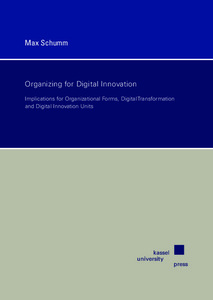| dc.date.accessioned | 2023-05-17T13:04:44Z | |
| dc.date.available | 2023-05-17T13:04:44Z | |
| dc.date.issued | 2023 | |
| dc.identifier | doi:10.17170/kobra-202304207848 | |
| dc.identifier.uri | http://hdl.handle.net/123456789/14712 | |
| dc.description | Zugleich: Dissertation, Universität Kassel, 2023 | |
| dc.language.iso | eng | |
| dc.publisher | kassel university press | |
| dc.rights | Namensnennung - Weitergabe unter gleichen Bedingungen 4.0 International | * |
| dc.rights.uri | http://creativecommons.org/licenses/by-sa/4.0/ | * |
| dc.subject | Digital innovation | eng |
| dc.subject | Digital transformation | eng |
| dc.subject | Organizational forms | eng |
| dc.subject | Digital innovation units | eng |
| dc.subject | Co-evolution | eng |
| dc.subject.ddc | 330 | |
| dc.subject.ddc | 360 | |
| dc.title | Organizing for Digital Innovation. Implications for Organizational Forms, Digital Transformation and Digital Innovation Units | eng |
| dc.type | Buch | |
| dcterms.abstract | This dissertation aims to explore appropriate ways of organizing for digital innovation. It builds on four studies to close knowledge gaps that have recently emerged. First, a longitudinal and holistic analysis of the co-evolution of digital innovations (and their inherent digital technologies) and organizational forms remains lacking, which prevents the use of valuable established knowledge to address emergent challenges and identify important gaps in our understanding. Therefore, the dissertation systematically analyzes 42 high-quality papers on the correlation between information systems and organizational forms.
Second, despite digital innovation units’ popularity in practice, the prospects of this initiative are not yet clear. Building on dynamic capabilities theory, this dissertation offers hypotheses on the performance implications of digital innovation units and employs panel data regressions on a longitudinal and cross-industry dataset to investigate formerly stated predictions. Third, as prior research has fallen short in explaining how digital innovation units survive and grow in light of the hurdles and challenges noted above, this dissertation conducts a case study and observes 16 digital innovation units inside one of the world’s leading automotive manufacturers to determine the mechanisms that drive digital innovation units to garner legitimacy for themselves and their outcomes. Fourth, to resolve the paradoxical tensions nested in digital innovation in industrial-age contexts, organizations need to transcend mere separation. As prior research does not explain how digital innovation units and their main organizations can cooperate symbiotically to create digital innovation, this dissertation reports on a Delphi survey involving 23 automotive experts to discover those answers. | eng |
| dcterms.accessRights | open access | |
| dcterms.creator | Schumm, Max | |
| dcterms.dateAccepted | 2023-04-18 | |
| dcterms.extent | 275 Seiten | |
| dc.contributor.referee | Hanelt, André (Prof. Dr.) | |
| dc.contributor.referee | Matt, Christian (Prof. Dr.) | |
| dc.publisher.place | Kassel | |
| dc.relation.isbn | isbn:978-3-7376-1114-5 | |
| dc.subject.swd | Digitalisierung | ger |
| dc.subject.swd | Innovationsmanagement | ger |
| dc.subject.swd | Coevolution | ger |
| dc.type.version | publishedVersion | ger |
| kup.iskup | true | |
| kup.price | 29,00 | |
| kup.subject | Sozialwissenschaft | ger |
| kup.subject | Wirtschaftswissenschaft | ger |
| kup.typ | Dissertation | |
| kup.institution | FB 07 / Wirtschaftswissenschaften | |
| kup.binding | Softcover | |
| kup.size | 17 x 24 cm | |
| ubks.epflicht | true | |




